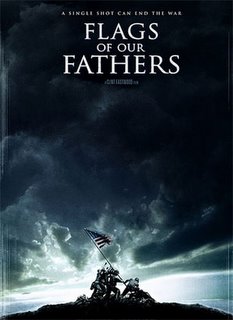 Clint Eastwood’s long, sparse epic “Flags of our Fathers” is an Anti-War war movie. According to the director, all war is bad. Bad for both sides. Bad for everybody. Countries use it to lie to their people to raise money. Foolish campaigns are carried out where thousands of troops die in a needless massacre. Every soldier is expendable. Every lie becomes propaganda. And nothing is ever worth the sacrifice.
Clint Eastwood’s long, sparse epic “Flags of our Fathers” is an Anti-War war movie. According to the director, all war is bad. Bad for both sides. Bad for everybody. Countries use it to lie to their people to raise money. Foolish campaigns are carried out where thousands of troops die in a needless massacre. Every soldier is expendable. Every lie becomes propaganda. And nothing is ever worth the sacrifice.The movie is visually arresting, with impeccable production design and period-drama precision. Everything, from the warships to the battlefield to the mainland, looks and feels authentic. The wide shots of the approaching armada at Iwo Jima are an awesome spectacle. 880 ships converging on this tiny little island is amazing to see.
The strength of the film is in the battle scenes. We are right there in the thick of it, grinding the black volcanic soil beneath out boots. The mortar shells, the machine guns, the confusion and panic. The horror and despair. “I’m no hero,” one of the characters says. “I was just trying not to get killed.” Scrambling among other 18 and 19-year olds, it seemed as if no one was in charge and nobody cared if you died.
And that’s the main problem with “Flags.” It never rises above the trenches. Oh, it gives complete honor and respect to the fighting men of our armed forces. There’s no question about that. But what were they fighting for? We’re never confronted with the larger struggle. We don’t see the global threat.
This was a world at war with Nazi Fascism and Militant Communism, the outcome of which could have dominated and oppressed the entire population of Europe and Asia, not to mention the looming takeover of the West. These enemies were truly evil, and had exterminated not only 6 million Jews, but countless masses across Europe. They blitzed London in the dead of night. They bombed us at Pearl Harbor. Good people had to fight back. And today’s freedom is the result.
But you’ll never hear that from “Flags of our Fathers.”
There’s a companion piece to this film, the upcoming “Letters from Iwo Jima,” which chronicles the horrors of war from Japan’s perspective. With its rushed release this Winter the filmmakers can say, “See audience? We’re not the good guys. They weren’t the bad guys. It’s war that’s bad! Bad! Bad! Bad!” And that’s the message, pounded home by guns, bombs, flash bulbs and trumpets. All war is bad, so you shouldn’t fight for anything. Let’s just hope the people who take over our country are really, really nice to us when we surrender.
